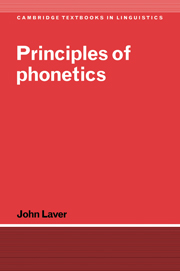Book contents
- Frontmatter
- Contents
- List of figures
- List of tables
- Preface
- Acknowledgements
- Introduction
- PART I General concepts
- 1 The semiotic framework
- 2 The relationship between phonetics and phonology
- 3 Accent, dialect and language
- PART II The analytic framework
- PART III Initiation and phonation
- PART IV Linear segmental analysis
- PART V Articulatory co-ordination and phonetic settings
- PART VI Temporal, prosodic and metrical analysis
- PART VII Principles of transcription
- PART VIII Conclusion
- Envoi
- Appendix I The phonetic alphabet of the International Phonetic Association
- Appendix II Index of languages
- References
- Index of names
- Subject index
3 - Accent, dialect and language
Published online by Cambridge University Press: 05 June 2012
- Frontmatter
- Contents
- List of figures
- List of tables
- Preface
- Acknowledgements
- Introduction
- PART I General concepts
- 1 The semiotic framework
- 2 The relationship between phonetics and phonology
- 3 Accent, dialect and language
- PART II The analytic framework
- PART III Initiation and phonation
- PART IV Linear segmental analysis
- PART V Articulatory co-ordination and phonetic settings
- PART VI Temporal, prosodic and metrical analysis
- PART VII Principles of transcription
- PART VIII Conclusion
- Envoi
- Appendix I The phonetic alphabet of the International Phonetic Association
- Appendix II Index of languages
- References
- Index of names
- Subject index
Summary
The purpose of this third preliminary chapter is to introduce some further basic concepts, this time to do with the variations of accent, dialect and language between speakers, and of these aspects of language across space and time. The discussion will include issues in dialectology, sociolinguistics, linguistic geography and historical linguistics. It is necessary to say from the outset that this chapter thus touches on disciplines to which phonetics makes a contribution, but which in themselves are not traditionally central to phonetics as such. It is also the case that the contribution of phonetics to these disciplines has so far not been as extensive as it might profitably be, and there is considerable room for further phonetic research in these areas. The treatment of these neighbouring disciplines is inevitably presented in rather general terms, but readers are likely to encounter in their wider reading in linguistics all the speech-related technical concepts introduced here.
An important initial distinction needs to be introduced between ‘accent’ and ‘dialect’. The technical meanings of both these terms differ from their everyday meanings. The technical meaning of the term accent is simply manner of pronunciation. In this sense, everyone speaks with an accent. Technically, it is not possible to speak aloud without speaking with an accent. The notion of accent is a phonological and phonetic concept, with some implications for the lexical level of analysis as well.
Information
- Type
- Chapter
- Information
- Principles of Phonetics , pp. 55 - 92Publisher: Cambridge University PressPrint publication year: 1994
